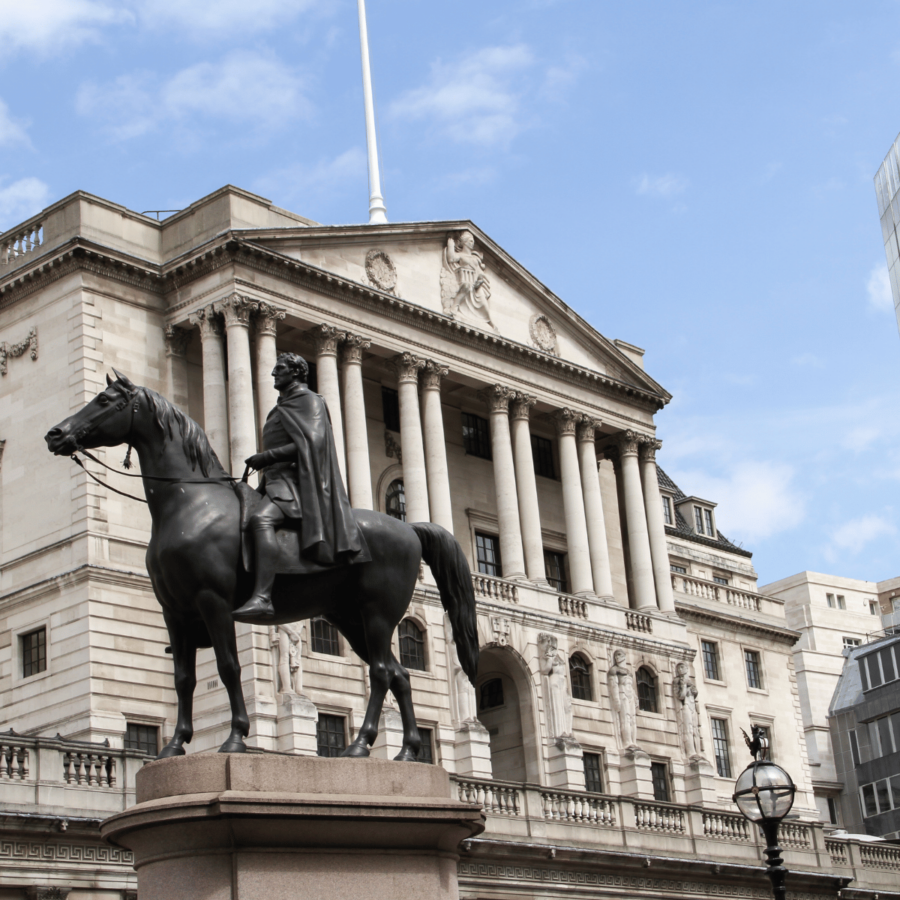Reassessing the Independence of the Bank of England
In March 2023, the House of Lords opened an inquiry to assess how the Bank of England’s operational independence has worked. The inquiry was motivated by the 25th anniversary of the 1998 Bank of England Act which granted independence to the Bank.

This ‘healthy’ review of institutional reforms coincides with heated discussions about the Bank of England’s performance in the past years, which is also in the process of reviewing its own operations and forecasts, and in the context of lowest levels of public confidence in the Bank.
In today’s Monday Interview, our Deputy Director, Professor Stephen Millard, speaks to Carolina Garriga, a Reader in the Department of Government at the University of Essex, to find out her views on the inquiry into operational independence, and the issues it considered.
Why is this review relevant? Isn’t this just a usual exercise?
Parliamentary inquiries are part of the British political culture, and in many other countries the legislative branch calls public officials to give explanations or to give testimony. However, this official public call to review the performance of the central bank in the long run is quite exceptional. In many instances, the Governor of the central bank is asked to explain policy decisions or the state of the economy. However, an overall analysis of the powers and functions of the central bank not explicitly framed in an intent of reforming the central bank are less common.
Reviewing and updating regulation is important, especially because regulatory lags may have pernicious consequences, as shown in some of my previous work. Reviewing delegation, however, has additional complications. Delegation of powers – in this case, giving independence to the Bank of England to decide monetary policy – implies removing policy away from political – and potentially voter – influence. Although this is the source of most concerns regarding democratic legitimacy of central banks’ powers, it is precisely the need to shield monetary policy from political influence that justifies the delegation of powers to central banks. Therefore, for central banks, these reviews can be a more sensitive affair. On the one hand, these reviews give the Bank an opportunity to explain the rationale of their operations. One of the main challenges for central banks – and especially the Bank of England – is to improve their communications, not only regarding the technicalities of their decisions, but also to secure public confidence. On the other hand, these reviews have the potential to undermine the bank’s credibility, and therefore its efficiency to conduct monetary policy. Official reviews or questioning of the central bank’s mandate and its use have been interpreted as contesting central banks’ independence. This does not mean that this was the intention of the review, but for monetary policy, there is always an underlying tension between democratic accountability and politicisation that we do not observe in the case of other regulatory agencies. Therefore, the reviews need to distinguish expert opinions from potential political pressure.
What were the areas of review?
This inquiry addressed some institutional issues – that is, whether the statutory framework was appropriately defined, whether decision-making could be improved – and other issues that go beyond the institutional design, such as the effective relations of the BoE with the Treasury and the Bank’s communications.
The Committee was particularly interested in the objectives included in the BoE’s mandate. As the mandate gets broader, the potential for conflicting incentives increase. Furthermore, one needs to keep in mind that it is hard to target multiple objectives with a limited number of instruments. All this opens questions regarding potential politicisation or overstretching of the mandate. Consequently, one of the most salient issues was the role of secondary objectives: in other worlds, to what extent including climate change in the BoE’s remit introduces tensions in pursuing monetary and financial stability? Similarly, to what extent the BoE’s Prudential Regulation Authority responsibilities affect its mission to maintain monetary and financial stability?
Although it was not part of the stated inquire, the issue of group thinking was also extensively addressed. The Committee wanted to understand to what extent the (in many dimensions) lack of diversity in the membership of the BoE’s committees could hurt the BoE’s forecasting and policymaking.
What does the inquiry suggest regarding the BoE’s statutory framework?
There were two important discussions regarding the statutory framework: the independence of the Bank of England, the motivation for the inquiry, and the mandate of the Bank.
There is a consensus that the BoE’s regulatory framework, and in particular, central bank independence worked appropriately for the purposes of maintaining price stability. The Bank was successful in controlling inflation for most of the past 25 years, in line with what one would expect when monetary policy is entrusted to independent central banks.
Yet, in the past couple of years, inflation performance has been worse in the UK than in the rest of the developed world. The question is whether this is a consequence of the institutional design, the Bank’s own decisions, or a series of shocks that are out of the Bank’s control. On the one hand, the combined effect of Covid and the war in Ukraine were systemic shocks, and most central banks reacted in a quite comparable way to these shocks. However, post-Brexit UK was in a structurally weaker position, not only in real terms, but also regarding market expectations and confidence in the stability of political decisions. The BoE had to deal with the effects of the mini-budget and of its not-so-clean reversal. Being ‘blindsided’ and forced to defend gilts further challenged the ability of the BoE to control rising prices. This is hardly a ‘normal’ context to judge to what extent inflation performance is an outcome of institutional design or of the BoE decisions. The BoE acknowledges their forecasting could be improved. The counterfactual, however, would be a less independent Bank of England operating in the same context. It seems reasonable to expect that this would have resulted in more inflation, more volatility, and worse monetary and economic outcomes.
As I mentioned before, the discussion around the BoE’s mandate pivoted on two issues: how to coordinate the double goal of financial and price stability in the Bank’s remit, and the role of secondary goals – such as a need to focus on environmental goals. The latter is a very interesting discussion, but it is not clear whether there is agreement between those promoting the inclusion of climate change as one of the concerns for the BoE and the Bank’s views of how to put this objective in practice. Andrew Bailey’s stated ‘overarching philosophy’ is that secondary objectives need to be seen through the lens of the primary objective. In his view, although climate change poses a risk to financial stability, the design of policies to adjust to climate change is outside the Bank’s focus and makes policymaking ‘more complicated.’ However, growing research on this topic, such as NIESR’s work on the macroeconomic effects of moving to net-zero has the potential for facilitating the integration of climate change considerations in the making of ‘traditional’ monetary policy.











